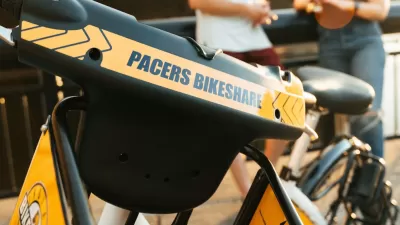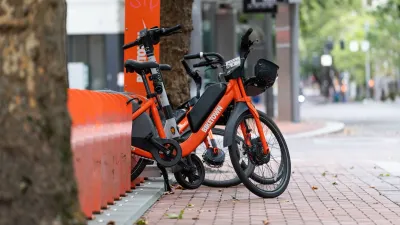The system overhaul is partly due to nextbike's shift to focusing on its European markets. The new fleet will include 350 e-bikes and expand service to new neighborhoods.

Pittsburgh's bike share system is getting an overhaul after hitting record numbers in its seventh year of operation, reports Ed Blazina.
"The agency rolled out its new system, called POGOH, featuring lighter, sturdier bikes at a news conference at Highmark Stadium Wednesday. The new system replaces Healthy Ride in about three weeks and current users will have to register again when it begins operation."
The system will also feature 200 new electric-assist bikes (half of the 400 bikes that will be added to the fleet) and 38 new stations. The new bicycles feature a more accessible design, according to David White, executive director of the city's bike share program, that will allow the system to drop its minimum age from 16 to 14.
By the end of the year, the agency plans to add 65 more new stations and 300 bikes. According to the article, "The system will continue to be sponsored by Highmark Blue Cross Blue Shield and the Allegheny Health Network. The agency also has received grants from the Heinz Endowments, the Hillman Foundation and the Richard King Mellon Foundation," along with a federal DOT grant.
"Since it opened in 2015, Bike Share has charged $2 for a 30-minute ride. The new system will charge $3.50 for each 30 minutes on a pedal bike and $5 for e-assist." People receiving government assistance will be eligible for a reduced rate.
"Bike Share had to completely rebuild its system because the previous supplier, nextbike, shifted its concentration to Europe, leaving Pittsburgh as its only American client. Additionally, that system used 3G equipment to communicate, and the three major suppliers of that system shut down earlier this year." The system will be supplied by Montreal-based PBSC Urban Solutions going forward.
FULL STORY: Bike Share Pittsburgh gets new bikes and a new system with a new name: POGOH

Maui's Vacation Rental Debate Turns Ugly
Verbal attacks, misinformation campaigns and fistfights plague a high-stakes debate to convert thousands of vacation rentals into long-term housing.

Planetizen Federal Action Tracker
A weekly monitor of how Trump’s orders and actions are impacting planners and planning in America.

San Francisco Suspends Traffic Calming Amidst Record Deaths
Citing “a challenging fiscal landscape,” the city will cease the program on the heels of 42 traffic deaths, including 24 pedestrians.

Defunct Pittsburgh Power Plant to Become Residential Tower
A decommissioned steam heat plant will be redeveloped into almost 100 affordable housing units.

Trump Prompts Restructuring of Transportation Research Board in “Unprecedented Overreach”
The TRB has eliminated more than half of its committees including those focused on climate, equity, and cities.

Amtrak Rolls Out New Orleans to Alabama “Mardi Gras” Train
The new service will operate morning and evening departures between Mobile and New Orleans.
Urban Design for Planners 1: Software Tools
This six-course series explores essential urban design concepts using open source software and equips planners with the tools they need to participate fully in the urban design process.
Planning for Universal Design
Learn the tools for implementing Universal Design in planning regulations.
Heyer Gruel & Associates PA
JM Goldson LLC
Custer County Colorado
City of Camden Redevelopment Agency
City of Astoria
Transportation Research & Education Center (TREC) at Portland State University
Jefferson Parish Government
Camden Redevelopment Agency
City of Claremont





























